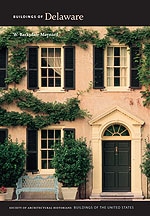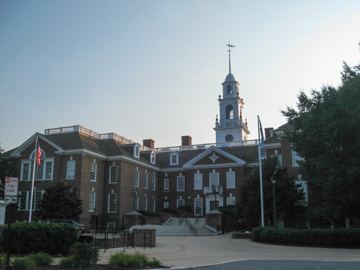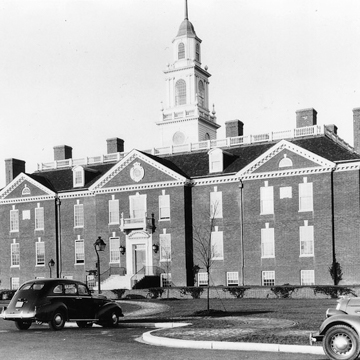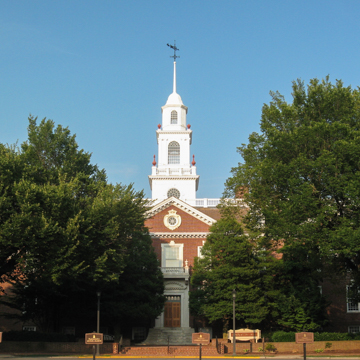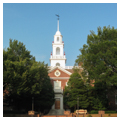You are here
Legislative Hall (State Legislative Building)
Delaware's state capitol is unique in the United States: it is the only one of Colonial Revival style or named a “Hall.” The architect E. William Martin had been working closely with Pierre S. du Pont on building Delaware schools. That it would be colonial was certain, given that H. Rodney Sharp and Mabel Lloyd Ridgely sat on the advisory committee and Isham, a Rhode Island antiquarian who was friends with H. F. du Pont of Winterthur (CH10), assisted. (Martin seems to have been brought in after Alfred Victor du Pont and others protested giving the Depression-era job to Isham, an out-of-stater.) The tiered tower was derived by Isham from the Old State House, Boston. Such details as the balcony over the front door, round-topped dormers, and pilaster-piers in the lobby recalled the Old Colony House, Newport, Rhode Island, which Isham had restored in 1932. Locher and Company of Glasgow, Virginia, provided handmade colonial bricks replicating those of the original state house nearby. The clay tiles of the hipped roof imitated cypress shingles. Fine woodwork in the House and Senate Chambers was executed by American Car and Foundry Company of Wilmington (murals by Bridgeville folk artist Jack Lewis in 1986 are a discordant addition). A pale green “colonial” paint scheme prevailed inside. The interior was refurbished in 1995–1997 (Moeckel Carbonell Associates). The park eastward, with handsome brick bridges over the St. Jones River, was constructed by the WPA (1936–1938).
Writing Credits
If SAH Archipedia has been useful to you, please consider supporting it.
SAH Archipedia tells the story of the United States through its buildings, landscapes, and cities. This freely available resource empowers the public with authoritative knowledge that deepens their understanding and appreciation of the built environment. But the Society of Architectural Historians, which created SAH Archipedia with University of Virginia Press, needs your support to maintain the high-caliber research, writing, photography, cartography, editing, design, and programming that make SAH Archipedia a trusted online resource available to all who value the history of place, heritage tourism, and learning.

